Key takeaways:
- Cannabis edibles require careful dosage and understanding of individual effects, emphasizing the importance of patience and respect in consumption.
- Legal disputes in the cannabis industry often stem from issues such as product labeling, licensing, and intellectual property, highlighting the necessity for compliance and clarity.
- Staying informed about regulations is crucial for avoiding costly mistakes, and meticulous documentation is vital in navigating legal challenges.
- Seeking professional guidance early and maintaining open communication can significantly aid in resolving disputes effectively.

Introduction to cannabis edibles
Cannabis edibles have revolutionized the way we experience the effects of cannabis. I still remember the first time I tried a homemade brownie; it was a mix of excitement and trepidation as I wondered how this sweet treat could alter my perception and mood. Have you ever found yourself curious about how different forms of cannabis might affect you?
These infused foods come in a variety of forms, from gummies to cookies, all promising distinct flavors and experiences. One thing I’ve learned is that dosage is key; the potency can vary significantly between products, leading to the age-old question: how much should I really consume? It’s fascinating to see how something as simple as a gummy bear can turn a casual evening into an unforgettable experience.
Understanding the effects of cannabis edibles is not just about choosing a product; it’s about finding what works for you. Reflecting on my own journey, I’ve had my fair share of miscalculations, resulting in some unexpected adventures. Those moments taught me to approach edibles with a sense of curiosity, but also with the respect they deserve.
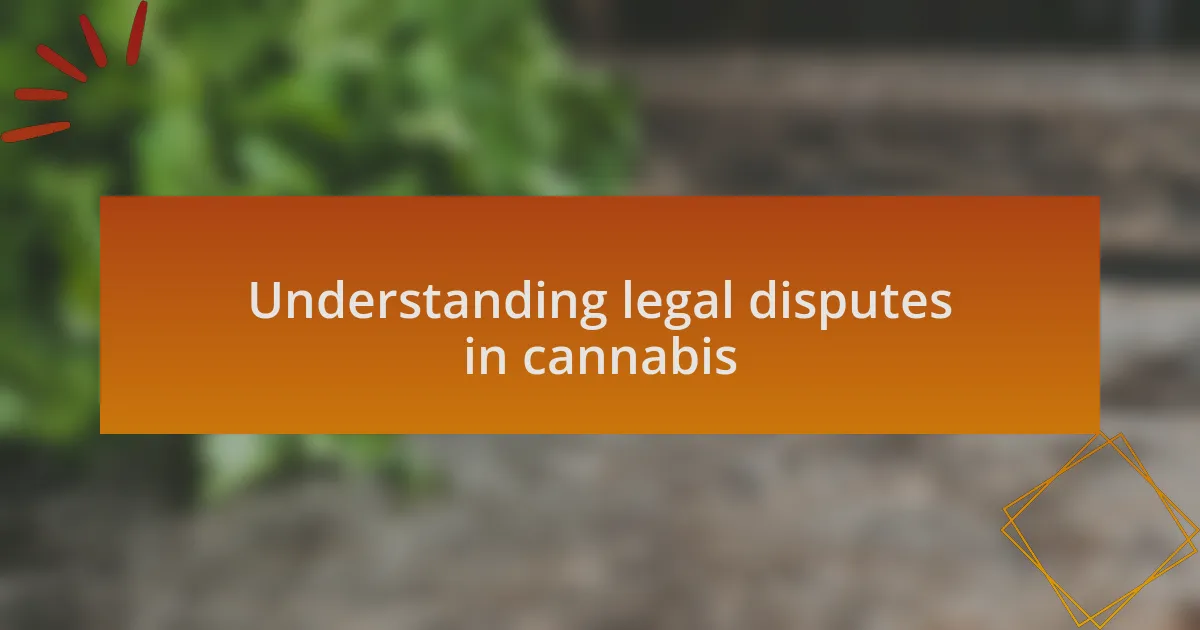
Understanding legal disputes in cannabis
Legal disputes in the cannabis industry can arise from various angles, including product labeling, licensing issues, and intellectual property claims. I remember a time when a friend of mine faced a legal battle over misleading claims on their edibles packaging. It was a stressful situation that highlighted how critical compliance is in this ever-evolving landscape.
Navigating legal disputes in cannabis requires a strong understanding of the local laws and regulations. I often found myself pouring over documents and regulations, thinking about how a seemingly simple ingredient could lead to significant legal repercussions. Have you ever wondered how much pressure growers and manufacturers face to stay compliant? Trust me, it’s immense.
Another layer to these disputes is the uncertainty surrounding federal versus state laws. My experience has shown that what’s acceptable in one state can lead to serious consequences in another. It brings to mind the importance of having a solid legal team; without proper guidance, even well-intentioned businesses can find themselves in hot water.
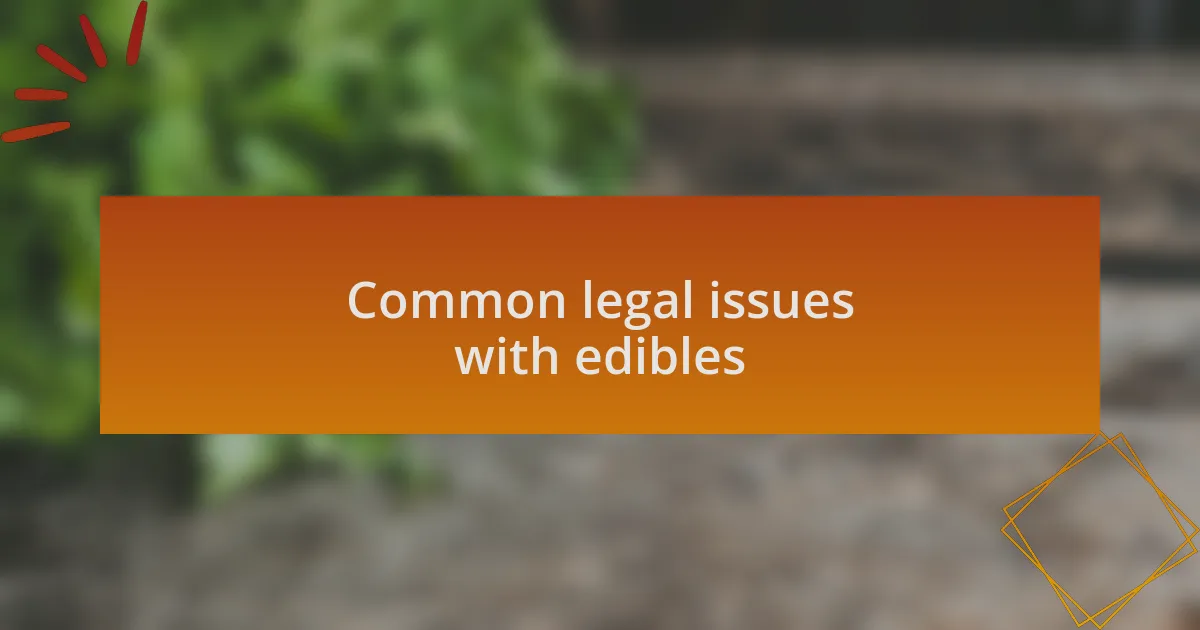
Common legal issues with edibles
One common legal issue surrounding cannabis edibles is product labeling. I recall a situation where a small producer I knew was sued for not clearly indicating the THC content on their packaging. As a consumer, I was shocked by how that oversight could potentially endanger someone’s health while also affecting the business financially. It made me realize just how essential it is for companies to be transparent about what they are selling.
Licensing issues can be another minefield. A friend who launched their edible line spent months navigating the application process, only to discover that they were missing a crucial local permit. I remember the frustration in their voice as they explained how this setback meant halting production and losing out on sales. It got me thinking—what if we lived in a world where the rules were clearer and easier to follow?
Then there’s the challenge of intellectual property. I once met a passionate entrepreneur whose original recipe for a popular edible was copied by a larger entity. The emotional toll it took on them was palpable as they shared their journey through the legal maze to protect their creation. It highlighted to me the importance of securing one’s unique formulas and branding, not just for legal reasons but for the peace of mind that comes with defending one’s hard work.
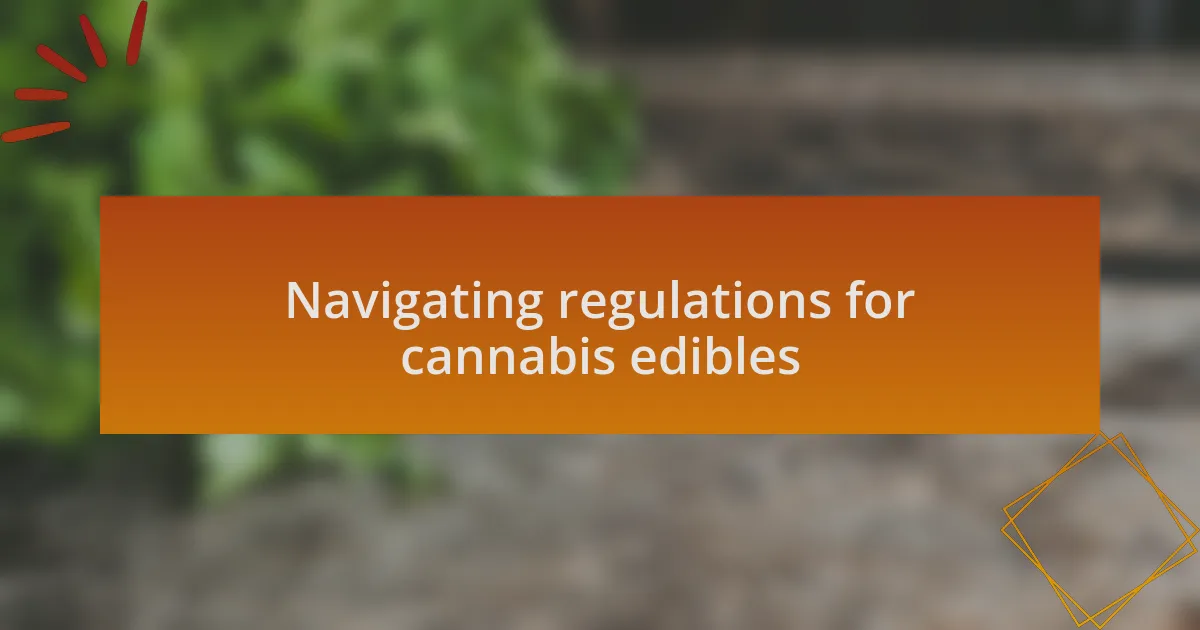
Navigating regulations for cannabis edibles
Stepping into the world of cannabis edibles is like entering a wild jungle of regulations. I remember when a small workshop I attended covered the maze of compliance—it felt overwhelming. How is anyone supposed to keep track of constantly changing laws across different states? It’s essential for anyone in the industry to stay informed about local and federal regulations to avoid costly missteps.
I once helped a friend revise their marketing materials after they received a warning from a regulatory body about misleading claims. The stress they experienced was significant; I could see how a simple error could not only hurt their reputation but also lead to legal actions. It’s a reminder that even the words we choose can carry heavy consequences in this industry.
Moreover, I noticed that some producers struggle with understanding the varying potency limits. Participating in discussions and forums has opened my eyes to how misinformation can spread. What might seem like a minor detail could potentially land someone in legal trouble overnight. For anyone navigating this space, I strongly recommend seeking expert advice whenever there’s uncertainty. It could save you not only time but also the heartache of dealing with legal disputes down the line.
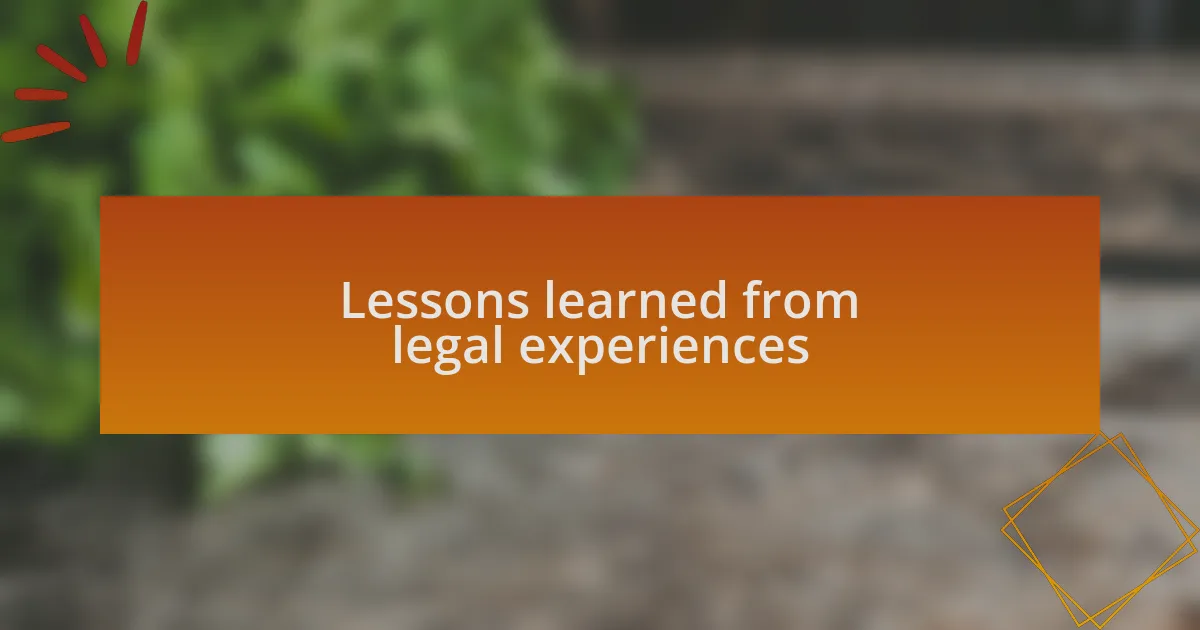
Lessons learned from legal experiences
While navigating legal disputes, I learned that documentation is a lifesaver. I once dealt with a situation where missing records led to a time-consuming legal battle. The anxiety of not having everything in order was a poignant reminder that in this industry, keeping meticulous records isn’t just good practice; it’s vital.
I vividly recall a friend who faced a substantial fine due to a misunderstanding about labeling requirements. Watching their frustration and helplessness as they fought against the system underscored the importance of clarity and precision in every aspect of compliance. It made me realize that taking the time to understand the legal landscape can save you from the turmoil of unexpected penalties.
Sometimes, the smallest misappliance of a rule can snowball into a significant issue. I once overheard a colleague grumbling about missing out on a lucrative business deal due to a licensing oversight. It made me think: how often do we assume we understand the rules? Staying proactive and continuously educating ourselves is essential—not just for success, but for peace of mind in an industry marked by constant evolution.
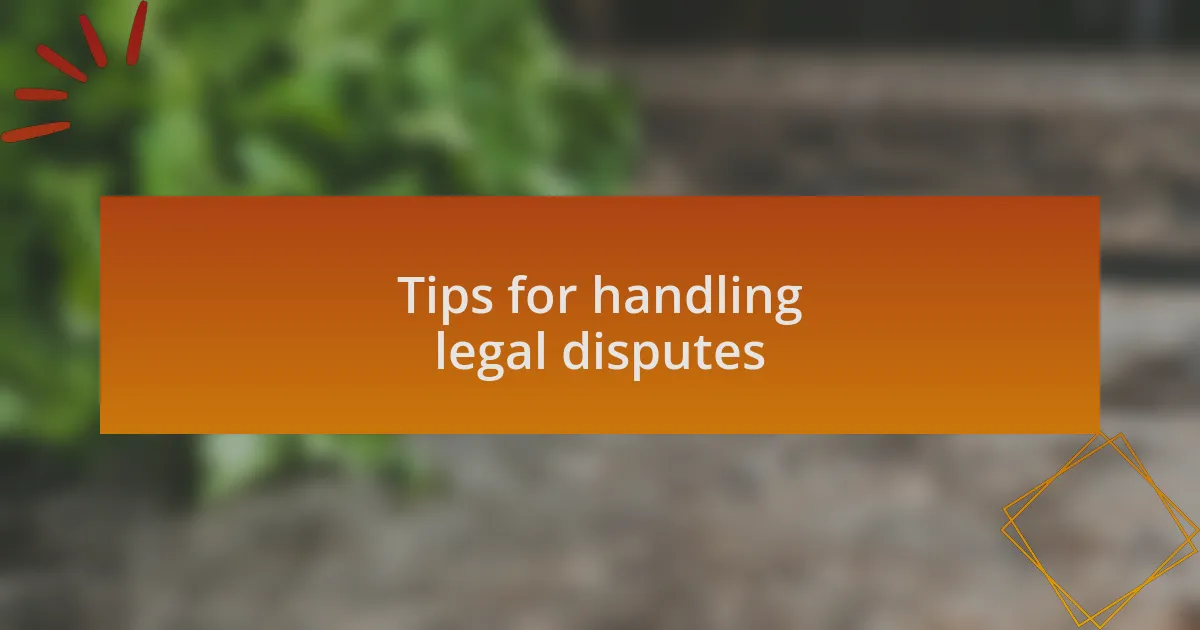
Tips for handling legal disputes
When faced with a legal dispute, I’ve found it crucial to seek professional guidance early on. I once hesitated to involve a lawyer, thinking it would escalate a minor issue, but that delay only compounded my problems. What I realized is that having an expert in your corner can provide clarity and help navigate the complexities, often preventing missteps that could cost time and money.
Communication is another pillar in resolving disputes effectively. I remember during a contentious negotiation, I took a breath and reached out to the opposing party directly to voice my concerns. This open dialogue didn’t just ease the tension; it created a space for mutual understanding, leading to a resolution faster than I anticipated. It’s a reminder that sometimes, stepping out of our comfort zone to connect can make all the difference.
Lastly, patience is key. I went through a drawn-out mediation process that tested my limits, as every back-and-forth felt like a never-ending cycle. But with time, I learned that staying calm and collected often yields better outcomes. How often do we rush for immediate answers when, in reality, allowing the process to unfold can be more beneficial? Trusting the journey can lead to unexpected solutions.